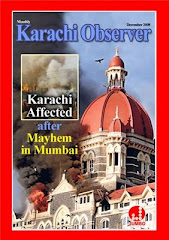
* Admiral Bashir says ‘if Kasab did go from here, when he entered Indian waters, where was the Indian Navy?’
* India rejects claim
KARACHI: Naval Chief of Staff Admiral Nauman Bashir said on Friday he had no proof that Ajmal Kasab – the lone surviving gunman arrested after the Mumbai attacks –used Pakistani waters to reach India.
“I do not have any proof, so I cannot confirm that claim,” said Nauman while addressing a press conference on upcoming multinational naval exercises, to be hosted by Pakistan. “The Indian navy is much larger than ours, and if Ajmal Kasab had gone from here, then what were their coastguards doing and why they did not stop the terrorists?” the naval commander was quoted as saying by the AFP news agency. Nauman declined further comment on the Mumbai attacks. “There are many questions about the Mumbai attacks which need to be answered and until then, we cannot make any comment.”
Indian rejection: According to the Times of India, New Delhi on Friday rubbished the Pakistan Navy chief’s claim. “The dossier handed over to Pakistan was irrefutable and solid on facts,” Home Minister P Chidambaram was quoted as saying at a press conference.
According to AFP, India’s junior foreign minister, Anand Sharma, also rejected the naval chief’s claim, and said Pakistan was engaging in ‘multiple speak, duplicity and denial’ and had ‘created this confusion’.
Indian police have charged Kasab with murder and ‘waging war’ against India.
* India rejects claim
KARACHI: Naval Chief of Staff Admiral Nauman Bashir said on Friday he had no proof that Ajmal Kasab – the lone surviving gunman arrested after the Mumbai attacks –used Pakistani waters to reach India.
“I do not have any proof, so I cannot confirm that claim,” said Nauman while addressing a press conference on upcoming multinational naval exercises, to be hosted by Pakistan. “The Indian navy is much larger than ours, and if Ajmal Kasab had gone from here, then what were their coastguards doing and why they did not stop the terrorists?” the naval commander was quoted as saying by the AFP news agency. Nauman declined further comment on the Mumbai attacks. “There are many questions about the Mumbai attacks which need to be answered and until then, we cannot make any comment.”
Indian rejection: According to the Times of India, New Delhi on Friday rubbished the Pakistan Navy chief’s claim. “The dossier handed over to Pakistan was irrefutable and solid on facts,” Home Minister P Chidambaram was quoted as saying at a press conference.
According to AFP, India’s junior foreign minister, Anand Sharma, also rejected the naval chief’s claim, and said Pakistan was engaging in ‘multiple speak, duplicity and denial’ and had ‘created this confusion’.
Indian police have charged Kasab with murder and ‘waging war’ against India.




































